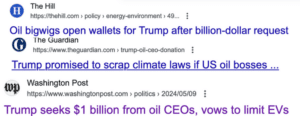U.S. Annexation Communications Strategies Mirror Climate Disinformation Strategies
Media Advisory, February 19th, 2025.
 The communications strategies being used by the United States government and annexation advocates in relation to Canada might seem chaotic and opaque in purpose. But for those in the climate movement these communications strategies are extremely familiar. The U.S. communications approach to Canada implements messaging approaches used by oil and gas corporations against climate action – strategies the climate movement has spent decades countering.
The communications strategies being used by the United States government and annexation advocates in relation to Canada might seem chaotic and opaque in purpose. But for those in the climate movement these communications strategies are extremely familiar. The U.S. communications approach to Canada implements messaging approaches used by oil and gas corporations against climate action – strategies the climate movement has spent decades countering.
Below we outline three of these strategies and cite mirrored examples between climate change and U.S.-Canada relations. We share these examples with you in the hopes that knowledge of these strategies will help inform your approach to these topics.
Strategy 1: Create chaos by shifting goal posts and creating multiple layers of disinformation that hinder action and generate division.
The point of this strategy is to divide and confuse decision makers and the general public while obscuring the real causes of a problem. You can see this in a constantly shifting set of frames to a situation.
- Climate messaging examples: Claims that ‘climate change isn’t real’ are followed by claims that ‘climate change is real but not caused by CO2’, then by ‘climate change is caused by CO2 but it’s not that bad’, then by ‘climate change is bad but we can capture the CO2 so we don’t need a shift from oil and gas’. Every step delays action to shift economies off of oil and gas.
- U.S.-Canada messaging relations examples: ‘The tariffs are coming because of immigration at the border,’ is followed by arguments about ‘fentanyl,’ ‘the digital services tax,’ and ‘trade deficits,’ and ‘hemispheric security’ that constantly shift. Each argument creates uncertainty about what the U.S. is after while disorienting Canada’s response and shifting the blame for the situation onto Canadians (as we discuss in greater detail below).
Strategy 2: Shift the centre of the debate and make the unreasonable seem reasonable.
This strategy focuses on capturing the idea of what is considered a reasonable argument in a debate and shifting that concept. Perfectly rational arguments and solutions to problems are dismissed or mis-framed as emotional, irrational, impractical, and/or utopian. Irrational arguments and solutions are likewise repeatedly framed as practical, rational, and realistic even though they are not.
- Climate messaging examples: ‘Climate change as a reality is debatable,’ ‘these emotional climate activists need to understand the reality of the situation,’ ‘we’d all love to live in a green utopia but that’s just not going to happen,’ ‘renewable energy just isn’t feasible,’ ‘they’re asking us to end oil and gas overnight.’
- U.S.-Canada messaging relations examples: ‘We should seriously discuss the idea of becoming a state or entering into an economic union with the U.S.,’ ‘booing the national anthem of a hostile power is impolite,’ ‘it’s just an emotional reaction to oppose an economic union with the U.S. we should be reasonable about it instead,’ ‘Canada can’t survive and be independent,’ the ‘U.S. foreign policy approach is very logical when you analyze it,’ ‘the U.S. could just take Canada from us if we don’t comply’ (this last one is practically false).
Strategy 3: Shift blame from the perpetrator onto those affected.
This strategy shifts blame for what is happening away from those making the situation worse onto those most impacted by the outcome.
- Climate messaging examples: ‘Individual choices are primarily to blame for climate change,’ ‘oil and gas corporations are just responding to market demand,’ ‘you use oil and gas therefore wanting a different future makes you a hypocrite.’ For context, for years oil and gas corporations – rather than simply responding to market demand – have blocked or hindered policies and measures that could expedite a shift to renewable energy.
- U.S.-Canada relations messaging examples: ‘Canadians are to blame for the situation we find ourselves in with the U.S.,’ ‘if only Canada does X then tariffs won’t happen,’ ‘if we don’t do what the U.S. wants then Canada will be subjugated by a different power,’ ‘Canada doesn’t have an independent identity,’ ‘Canada has been a bad friend to the U.S.’
One of the first and most ardent advocates for an economic union with the U.S., Kevin O’Leary, along with many of the voices calling for that union are also oil and gas expansion advocates. They, and the U.S. Government, are employing the very same strategies and tactics against Canadian sovereignty that we have seen used to advocate for continued reliance on oil and gas and to deny climate realities.
It is also important to note that these tactics prey on a desire for catchy headlines and on a desire to sound reasonable to an audience. Despite the overwhelming evidence that climate change is real and that fossil fuel reliance is its primary cause these strategies have effectively stalled climate action in the past.
Oil and gas corporations got these strategies from the tobacco industry, and they are effective if they are allowed to work.
– 30 –
For more information please contact: Media@sierraclub.ca
